Analyzing Consumer Preferences and Trends in Hospitality Sector
VerifiedAdded on 2022/08/14
|18
|4779
|17
Report
AI Summary
This report examines current trends in the hospitality industry, focusing on consumer behavior, particularly regarding green hotels and sustainable practices. It explores the impact of environmental concerns on consumer choices and analyzes the influence of altruism and the theory of planned behavior (TPB) on behavioral intentions. The report reviews existing literature to understand how green hotels attract consumers and identifies factors affecting consumer preferences. It investigates the relationship between altruism and the intention to choose eco-friendly options. The methodology, results, and discussions delve into the factors influencing consumer decisions, including attitudes, subjective norms, and perceived behavioral control. The report concludes with recommendations for the hospitality industry to cater to environmentally conscious consumers, emphasizing the importance of sustainability and green initiatives in attracting and retaining customers. The research aims to provide insights into the evolving consumer landscape and the growing demand for sustainable tourism options.
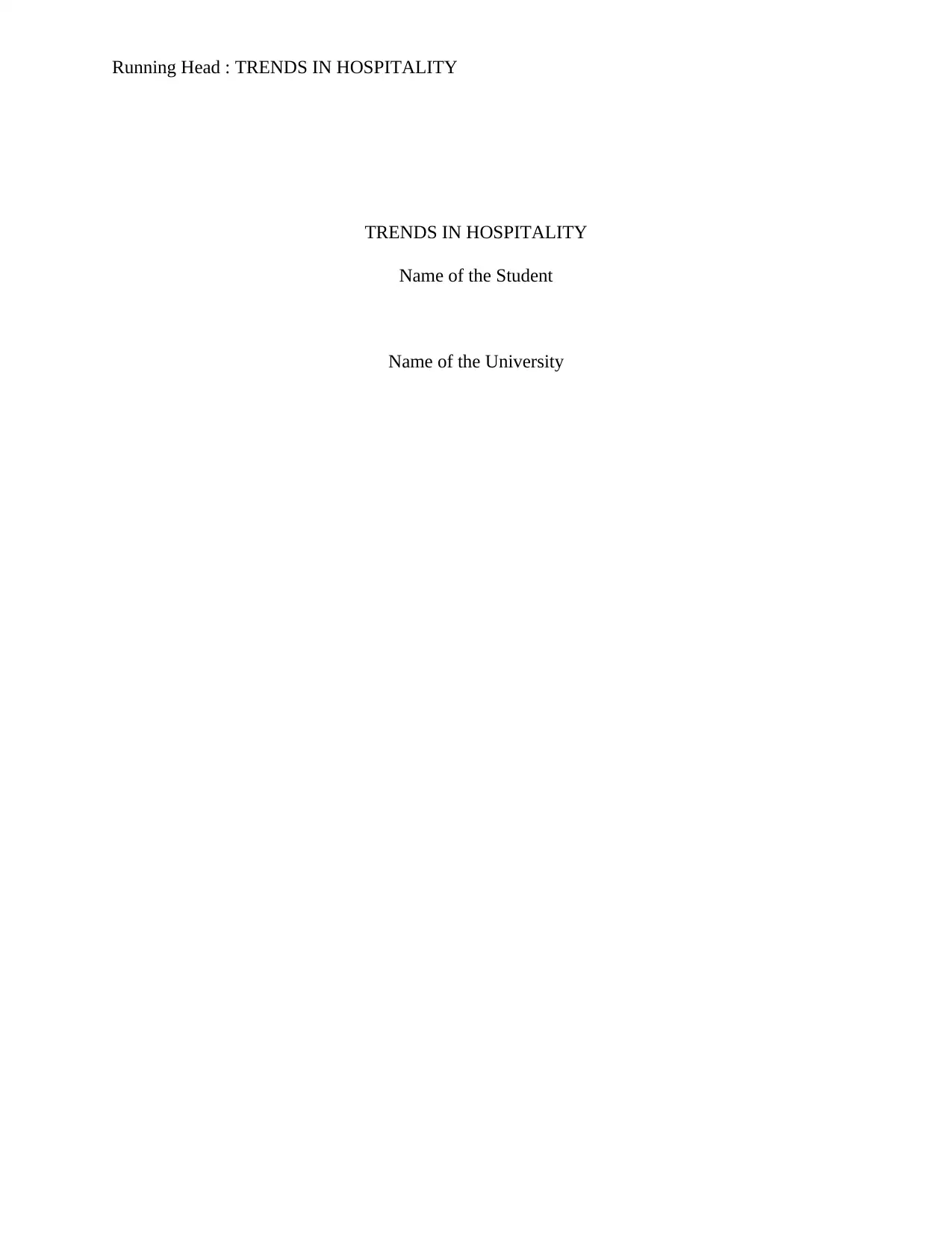
Running Head : TRENDS IN HOSPITALITY
TRENDS IN HOSPITALITY
Name of the Student
Name of the University
TRENDS IN HOSPITALITY
Name of the Student
Name of the University
Paraphrase This Document
Need a fresh take? Get an instant paraphrase of this document with our AI Paraphraser
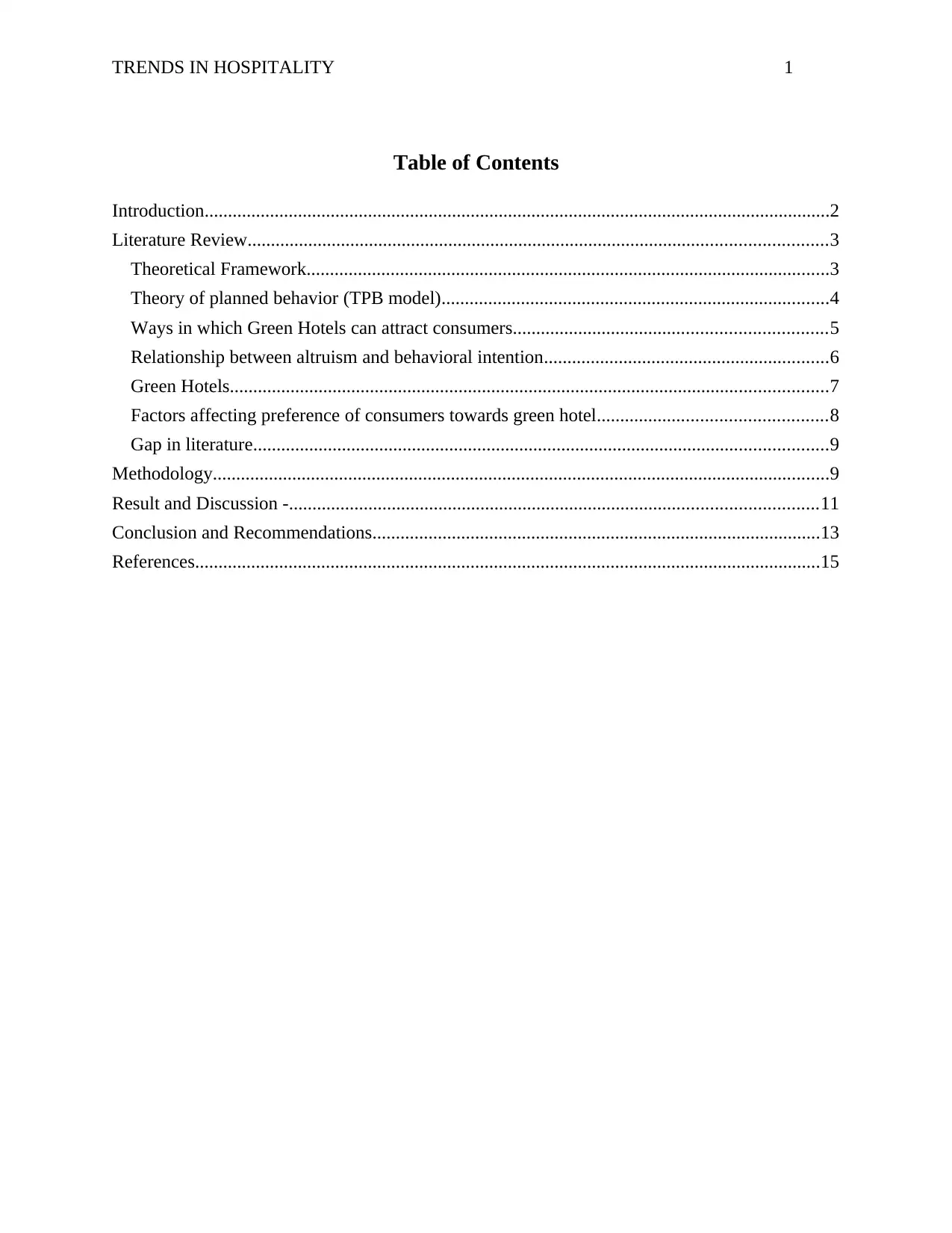
TRENDS IN HOSPITALITY 1
Table of Contents
Introduction......................................................................................................................................2
Literature Review............................................................................................................................3
Theoretical Framework................................................................................................................3
Theory of planned behavior (TPB model)...................................................................................4
Ways in which Green Hotels can attract consumers...................................................................5
Relationship between altruism and behavioral intention.............................................................6
Green Hotels................................................................................................................................7
Factors affecting preference of consumers towards green hotel.................................................8
Gap in literature...........................................................................................................................9
Methodology....................................................................................................................................9
Result and Discussion -.................................................................................................................11
Conclusion and Recommendations................................................................................................13
References......................................................................................................................................15
Table of Contents
Introduction......................................................................................................................................2
Literature Review............................................................................................................................3
Theoretical Framework................................................................................................................3
Theory of planned behavior (TPB model)...................................................................................4
Ways in which Green Hotels can attract consumers...................................................................5
Relationship between altruism and behavioral intention.............................................................6
Green Hotels................................................................................................................................7
Factors affecting preference of consumers towards green hotel.................................................8
Gap in literature...........................................................................................................................9
Methodology....................................................................................................................................9
Result and Discussion -.................................................................................................................11
Conclusion and Recommendations................................................................................................13
References......................................................................................................................................15
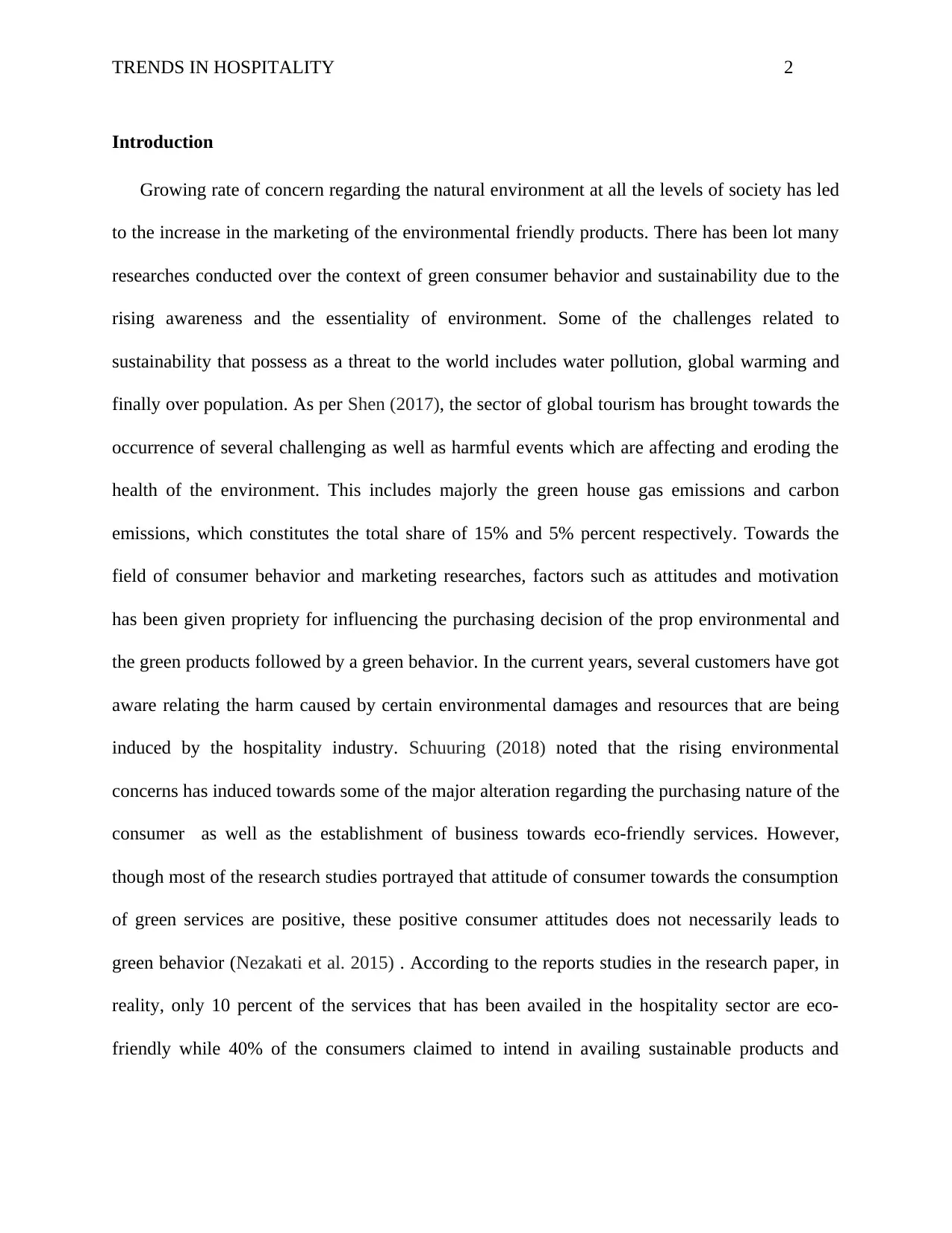
TRENDS IN HOSPITALITY 2
Introduction
Growing rate of concern regarding the natural environment at all the levels of society has led
to the increase in the marketing of the environmental friendly products. There has been lot many
researches conducted over the context of green consumer behavior and sustainability due to the
rising awareness and the essentiality of environment. Some of the challenges related to
sustainability that possess as a threat to the world includes water pollution, global warming and
finally over population. As per Shen (2017), the sector of global tourism has brought towards the
occurrence of several challenging as well as harmful events which are affecting and eroding the
health of the environment. This includes majorly the green house gas emissions and carbon
emissions, which constitutes the total share of 15% and 5% percent respectively. Towards the
field of consumer behavior and marketing researches, factors such as attitudes and motivation
has been given propriety for influencing the purchasing decision of the prop environmental and
the green products followed by a green behavior. In the current years, several customers have got
aware relating the harm caused by certain environmental damages and resources that are being
induced by the hospitality industry. Schuuring (2018) noted that the rising environmental
concerns has induced towards some of the major alteration regarding the purchasing nature of the
consumer as well as the establishment of business towards eco-friendly services. However,
though most of the research studies portrayed that attitude of consumer towards the consumption
of green services are positive, these positive consumer attitudes does not necessarily leads to
green behavior (Nezakati et al. 2015) . According to the reports studies in the research paper, in
reality, only 10 percent of the services that has been availed in the hospitality sector are eco-
friendly while 40% of the consumers claimed to intend in availing sustainable products and
Introduction
Growing rate of concern regarding the natural environment at all the levels of society has led
to the increase in the marketing of the environmental friendly products. There has been lot many
researches conducted over the context of green consumer behavior and sustainability due to the
rising awareness and the essentiality of environment. Some of the challenges related to
sustainability that possess as a threat to the world includes water pollution, global warming and
finally over population. As per Shen (2017), the sector of global tourism has brought towards the
occurrence of several challenging as well as harmful events which are affecting and eroding the
health of the environment. This includes majorly the green house gas emissions and carbon
emissions, which constitutes the total share of 15% and 5% percent respectively. Towards the
field of consumer behavior and marketing researches, factors such as attitudes and motivation
has been given propriety for influencing the purchasing decision of the prop environmental and
the green products followed by a green behavior. In the current years, several customers have got
aware relating the harm caused by certain environmental damages and resources that are being
induced by the hospitality industry. Schuuring (2018) noted that the rising environmental
concerns has induced towards some of the major alteration regarding the purchasing nature of the
consumer as well as the establishment of business towards eco-friendly services. However,
though most of the research studies portrayed that attitude of consumer towards the consumption
of green services are positive, these positive consumer attitudes does not necessarily leads to
green behavior (Nezakati et al. 2015) . According to the reports studies in the research paper, in
reality, only 10 percent of the services that has been availed in the hospitality sector are eco-
friendly while 40% of the consumers claimed to intend in availing sustainable products and
⊘ This is a preview!⊘
Do you want full access?
Subscribe today to unlock all pages.

Trusted by 1+ million students worldwide
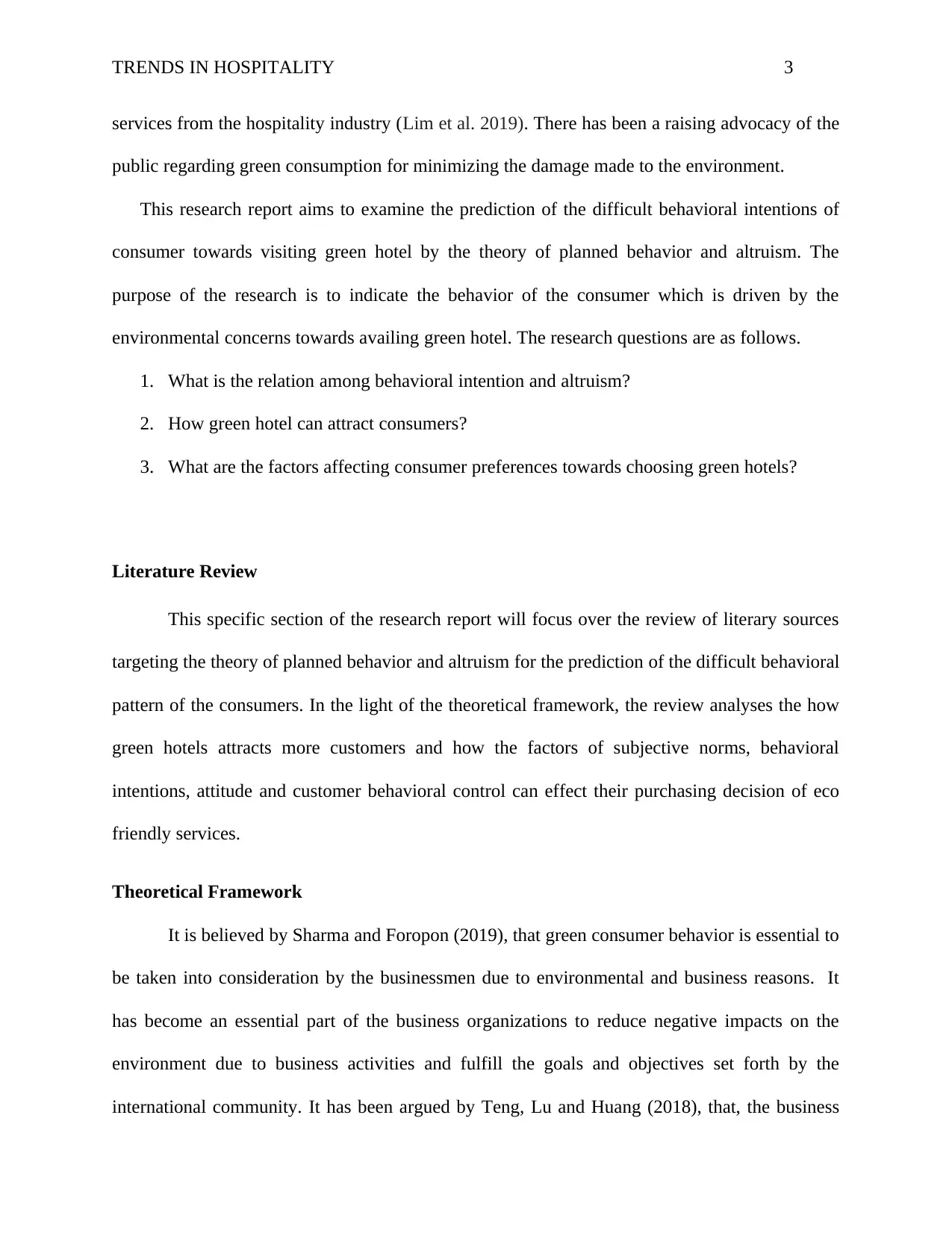
TRENDS IN HOSPITALITY 3
services from the hospitality industry (Lim et al. 2019). There has been a raising advocacy of the
public regarding green consumption for minimizing the damage made to the environment.
This research report aims to examine the prediction of the difficult behavioral intentions of
consumer towards visiting green hotel by the theory of planned behavior and altruism. The
purpose of the research is to indicate the behavior of the consumer which is driven by the
environmental concerns towards availing green hotel. The research questions are as follows.
1. What is the relation among behavioral intention and altruism?
2. How green hotel can attract consumers?
3. What are the factors affecting consumer preferences towards choosing green hotels?
Literature Review
This specific section of the research report will focus over the review of literary sources
targeting the theory of planned behavior and altruism for the prediction of the difficult behavioral
pattern of the consumers. In the light of the theoretical framework, the review analyses the how
green hotels attracts more customers and how the factors of subjective norms, behavioral
intentions, attitude and customer behavioral control can effect their purchasing decision of eco
friendly services.
Theoretical Framework
It is believed by Sharma and Foropon (2019), that green consumer behavior is essential to
be taken into consideration by the businessmen due to environmental and business reasons. It
has become an essential part of the business organizations to reduce negative impacts on the
environment due to business activities and fulfill the goals and objectives set forth by the
international community. It has been argued by Teng, Lu and Huang (2018), that, the business
services from the hospitality industry (Lim et al. 2019). There has been a raising advocacy of the
public regarding green consumption for minimizing the damage made to the environment.
This research report aims to examine the prediction of the difficult behavioral intentions of
consumer towards visiting green hotel by the theory of planned behavior and altruism. The
purpose of the research is to indicate the behavior of the consumer which is driven by the
environmental concerns towards availing green hotel. The research questions are as follows.
1. What is the relation among behavioral intention and altruism?
2. How green hotel can attract consumers?
3. What are the factors affecting consumer preferences towards choosing green hotels?
Literature Review
This specific section of the research report will focus over the review of literary sources
targeting the theory of planned behavior and altruism for the prediction of the difficult behavioral
pattern of the consumers. In the light of the theoretical framework, the review analyses the how
green hotels attracts more customers and how the factors of subjective norms, behavioral
intentions, attitude and customer behavioral control can effect their purchasing decision of eco
friendly services.
Theoretical Framework
It is believed by Sharma and Foropon (2019), that green consumer behavior is essential to
be taken into consideration by the businessmen due to environmental and business reasons. It
has become an essential part of the business organizations to reduce negative impacts on the
environment due to business activities and fulfill the goals and objectives set forth by the
international community. It has been argued by Teng, Lu and Huang (2018), that, the business
Paraphrase This Document
Need a fresh take? Get an instant paraphrase of this document with our AI Paraphraser
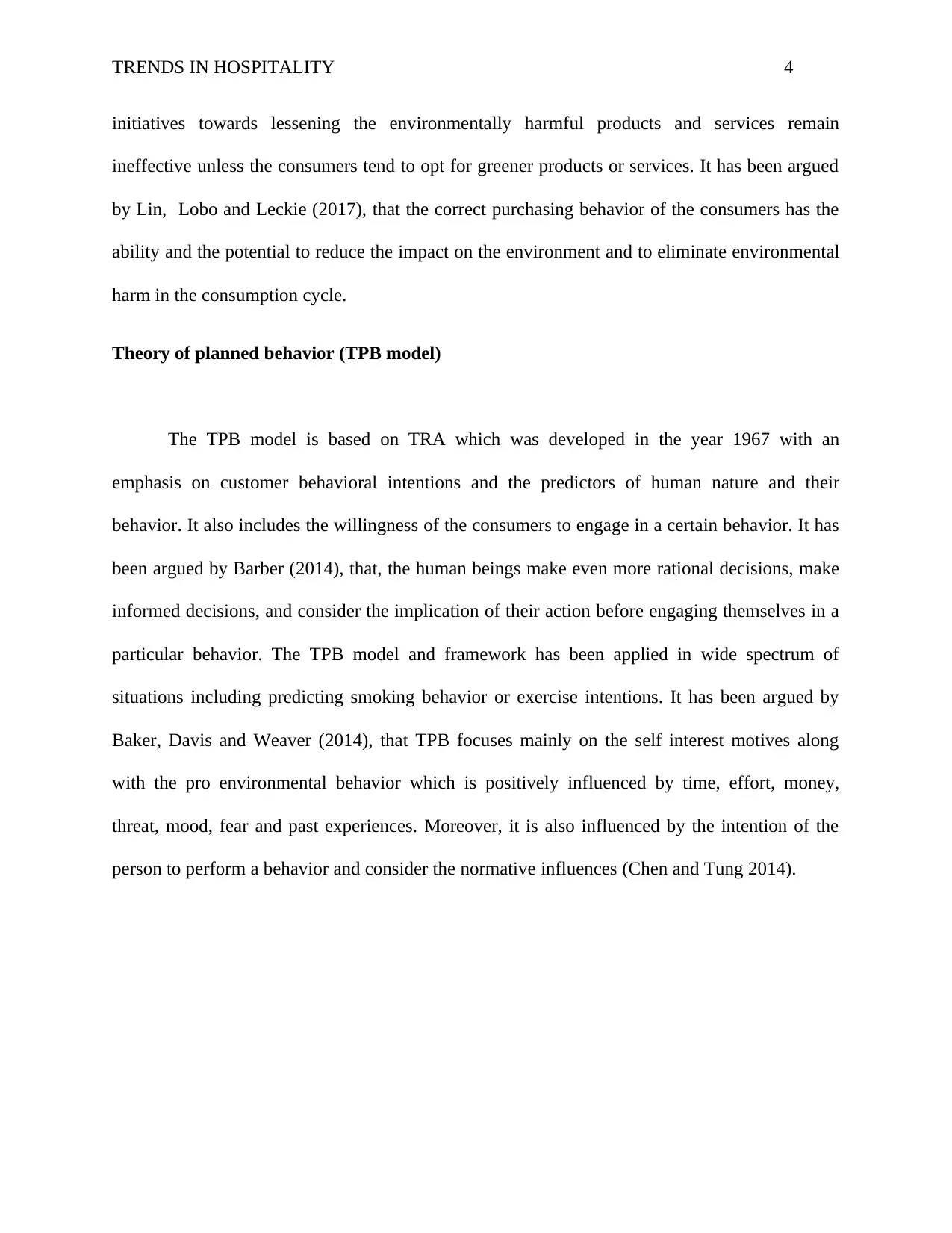
TRENDS IN HOSPITALITY 4
initiatives towards lessening the environmentally harmful products and services remain
ineffective unless the consumers tend to opt for greener products or services. It has been argued
by Lin, Lobo and Leckie (2017), that the correct purchasing behavior of the consumers has the
ability and the potential to reduce the impact on the environment and to eliminate environmental
harm in the consumption cycle.
Theory of planned behavior (TPB model)
The TPB model is based on TRA which was developed in the year 1967 with an
emphasis on customer behavioral intentions and the predictors of human nature and their
behavior. It also includes the willingness of the consumers to engage in a certain behavior. It has
been argued by Barber (2014), that, the human beings make even more rational decisions, make
informed decisions, and consider the implication of their action before engaging themselves in a
particular behavior. The TPB model and framework has been applied in wide spectrum of
situations including predicting smoking behavior or exercise intentions. It has been argued by
Baker, Davis and Weaver (2014), that TPB focuses mainly on the self interest motives along
with the pro environmental behavior which is positively influenced by time, effort, money,
threat, mood, fear and past experiences. Moreover, it is also influenced by the intention of the
person to perform a behavior and consider the normative influences (Chen and Tung 2014).
initiatives towards lessening the environmentally harmful products and services remain
ineffective unless the consumers tend to opt for greener products or services. It has been argued
by Lin, Lobo and Leckie (2017), that the correct purchasing behavior of the consumers has the
ability and the potential to reduce the impact on the environment and to eliminate environmental
harm in the consumption cycle.
Theory of planned behavior (TPB model)
The TPB model is based on TRA which was developed in the year 1967 with an
emphasis on customer behavioral intentions and the predictors of human nature and their
behavior. It also includes the willingness of the consumers to engage in a certain behavior. It has
been argued by Barber (2014), that, the human beings make even more rational decisions, make
informed decisions, and consider the implication of their action before engaging themselves in a
particular behavior. The TPB model and framework has been applied in wide spectrum of
situations including predicting smoking behavior or exercise intentions. It has been argued by
Baker, Davis and Weaver (2014), that TPB focuses mainly on the self interest motives along
with the pro environmental behavior which is positively influenced by time, effort, money,
threat, mood, fear and past experiences. Moreover, it is also influenced by the intention of the
person to perform a behavior and consider the normative influences (Chen and Tung 2014).
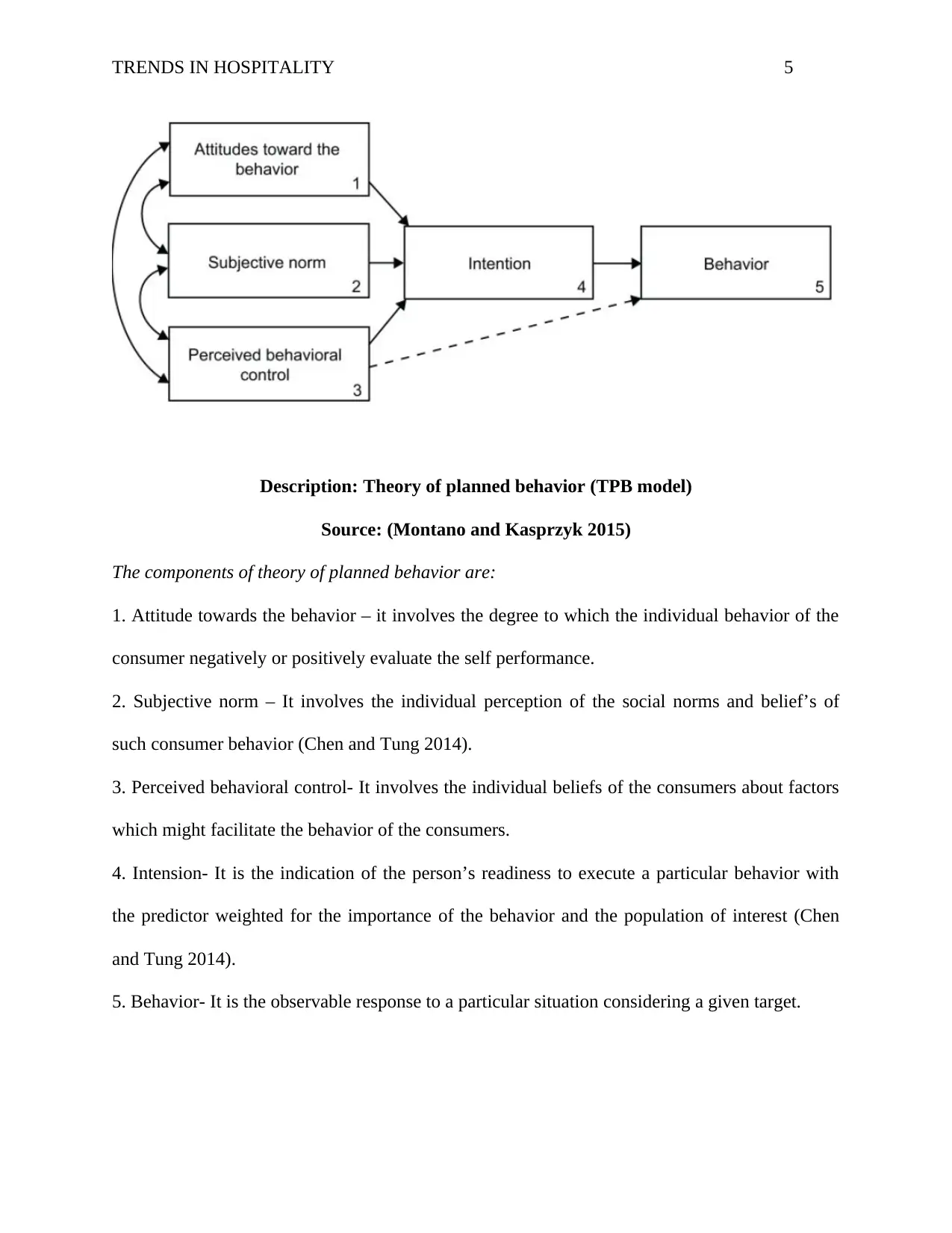
TRENDS IN HOSPITALITY 5
Description: Theory of planned behavior (TPB model)
Source: (Montano and Kasprzyk 2015)
The components of theory of planned behavior are:
1. Attitude towards the behavior – it involves the degree to which the individual behavior of the
consumer negatively or positively evaluate the self performance.
2. Subjective norm – It involves the individual perception of the social norms and belief’s of
such consumer behavior (Chen and Tung 2014).
3. Perceived behavioral control- It involves the individual beliefs of the consumers about factors
which might facilitate the behavior of the consumers.
4. Intension- It is the indication of the person’s readiness to execute a particular behavior with
the predictor weighted for the importance of the behavior and the population of interest (Chen
and Tung 2014).
5. Behavior- It is the observable response to a particular situation considering a given target.
Description: Theory of planned behavior (TPB model)
Source: (Montano and Kasprzyk 2015)
The components of theory of planned behavior are:
1. Attitude towards the behavior – it involves the degree to which the individual behavior of the
consumer negatively or positively evaluate the self performance.
2. Subjective norm – It involves the individual perception of the social norms and belief’s of
such consumer behavior (Chen and Tung 2014).
3. Perceived behavioral control- It involves the individual beliefs of the consumers about factors
which might facilitate the behavior of the consumers.
4. Intension- It is the indication of the person’s readiness to execute a particular behavior with
the predictor weighted for the importance of the behavior and the population of interest (Chen
and Tung 2014).
5. Behavior- It is the observable response to a particular situation considering a given target.
⊘ This is a preview!⊘
Do you want full access?
Subscribe today to unlock all pages.

Trusted by 1+ million students worldwide
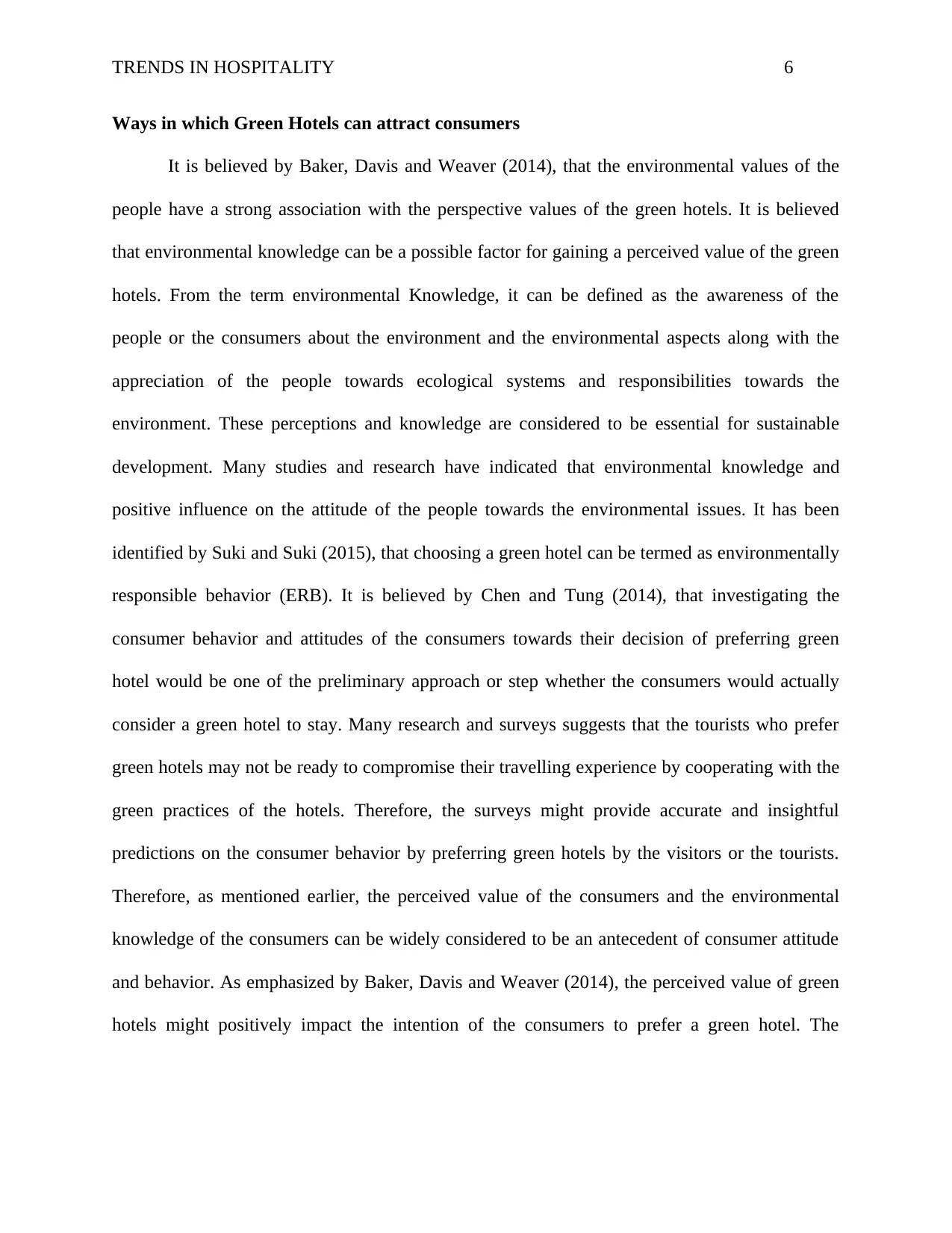
TRENDS IN HOSPITALITY 6
Ways in which Green Hotels can attract consumers
It is believed by Baker, Davis and Weaver (2014), that the environmental values of the
people have a strong association with the perspective values of the green hotels. It is believed
that environmental knowledge can be a possible factor for gaining a perceived value of the green
hotels. From the term environmental Knowledge, it can be defined as the awareness of the
people or the consumers about the environment and the environmental aspects along with the
appreciation of the people towards ecological systems and responsibilities towards the
environment. These perceptions and knowledge are considered to be essential for sustainable
development. Many studies and research have indicated that environmental knowledge and
positive influence on the attitude of the people towards the environmental issues. It has been
identified by Suki and Suki (2015), that choosing a green hotel can be termed as environmentally
responsible behavior (ERB). It is believed by Chen and Tung (2014), that investigating the
consumer behavior and attitudes of the consumers towards their decision of preferring green
hotel would be one of the preliminary approach or step whether the consumers would actually
consider a green hotel to stay. Many research and surveys suggests that the tourists who prefer
green hotels may not be ready to compromise their travelling experience by cooperating with the
green practices of the hotels. Therefore, the surveys might provide accurate and insightful
predictions on the consumer behavior by preferring green hotels by the visitors or the tourists.
Therefore, as mentioned earlier, the perceived value of the consumers and the environmental
knowledge of the consumers can be widely considered to be an antecedent of consumer attitude
and behavior. As emphasized by Baker, Davis and Weaver (2014), the perceived value of green
hotels might positively impact the intention of the consumers to prefer a green hotel. The
Ways in which Green Hotels can attract consumers
It is believed by Baker, Davis and Weaver (2014), that the environmental values of the
people have a strong association with the perspective values of the green hotels. It is believed
that environmental knowledge can be a possible factor for gaining a perceived value of the green
hotels. From the term environmental Knowledge, it can be defined as the awareness of the
people or the consumers about the environment and the environmental aspects along with the
appreciation of the people towards ecological systems and responsibilities towards the
environment. These perceptions and knowledge are considered to be essential for sustainable
development. Many studies and research have indicated that environmental knowledge and
positive influence on the attitude of the people towards the environmental issues. It has been
identified by Suki and Suki (2015), that choosing a green hotel can be termed as environmentally
responsible behavior (ERB). It is believed by Chen and Tung (2014), that investigating the
consumer behavior and attitudes of the consumers towards their decision of preferring green
hotel would be one of the preliminary approach or step whether the consumers would actually
consider a green hotel to stay. Many research and surveys suggests that the tourists who prefer
green hotels may not be ready to compromise their travelling experience by cooperating with the
green practices of the hotels. Therefore, the surveys might provide accurate and insightful
predictions on the consumer behavior by preferring green hotels by the visitors or the tourists.
Therefore, as mentioned earlier, the perceived value of the consumers and the environmental
knowledge of the consumers can be widely considered to be an antecedent of consumer attitude
and behavior. As emphasized by Baker, Davis and Weaver (2014), the perceived value of green
hotels might positively impact the intention of the consumers to prefer a green hotel. The
Paraphrase This Document
Need a fresh take? Get an instant paraphrase of this document with our AI Paraphraser
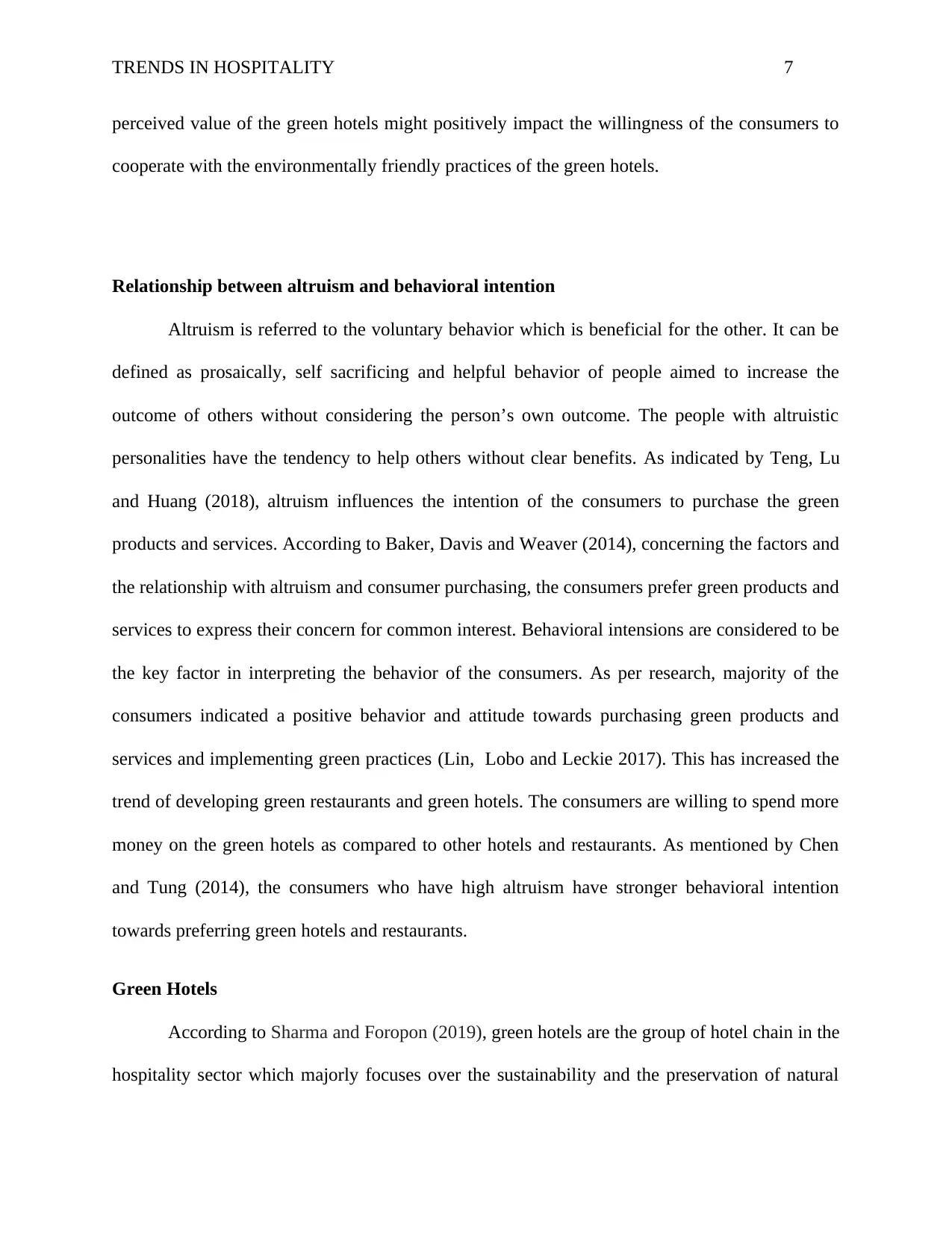
TRENDS IN HOSPITALITY 7
perceived value of the green hotels might positively impact the willingness of the consumers to
cooperate with the environmentally friendly practices of the green hotels.
Relationship between altruism and behavioral intention
Altruism is referred to the voluntary behavior which is beneficial for the other. It can be
defined as prosaically, self sacrificing and helpful behavior of people aimed to increase the
outcome of others without considering the person’s own outcome. The people with altruistic
personalities have the tendency to help others without clear benefits. As indicated by Teng, Lu
and Huang (2018), altruism influences the intention of the consumers to purchase the green
products and services. According to Baker, Davis and Weaver (2014), concerning the factors and
the relationship with altruism and consumer purchasing, the consumers prefer green products and
services to express their concern for common interest. Behavioral intensions are considered to be
the key factor in interpreting the behavior of the consumers. As per research, majority of the
consumers indicated a positive behavior and attitude towards purchasing green products and
services and implementing green practices (Lin, Lobo and Leckie 2017). This has increased the
trend of developing green restaurants and green hotels. The consumers are willing to spend more
money on the green hotels as compared to other hotels and restaurants. As mentioned by Chen
and Tung (2014), the consumers who have high altruism have stronger behavioral intention
towards preferring green hotels and restaurants.
Green Hotels
According to Sharma and Foropon (2019), green hotels are the group of hotel chain in the
hospitality sector which majorly focuses over the sustainability and the preservation of natural
perceived value of the green hotels might positively impact the willingness of the consumers to
cooperate with the environmentally friendly practices of the green hotels.
Relationship between altruism and behavioral intention
Altruism is referred to the voluntary behavior which is beneficial for the other. It can be
defined as prosaically, self sacrificing and helpful behavior of people aimed to increase the
outcome of others without considering the person’s own outcome. The people with altruistic
personalities have the tendency to help others without clear benefits. As indicated by Teng, Lu
and Huang (2018), altruism influences the intention of the consumers to purchase the green
products and services. According to Baker, Davis and Weaver (2014), concerning the factors and
the relationship with altruism and consumer purchasing, the consumers prefer green products and
services to express their concern for common interest. Behavioral intensions are considered to be
the key factor in interpreting the behavior of the consumers. As per research, majority of the
consumers indicated a positive behavior and attitude towards purchasing green products and
services and implementing green practices (Lin, Lobo and Leckie 2017). This has increased the
trend of developing green restaurants and green hotels. The consumers are willing to spend more
money on the green hotels as compared to other hotels and restaurants. As mentioned by Chen
and Tung (2014), the consumers who have high altruism have stronger behavioral intention
towards preferring green hotels and restaurants.
Green Hotels
According to Sharma and Foropon (2019), green hotels are the group of hotel chain in the
hospitality sector which majorly focuses over the sustainability and the preservation of natural
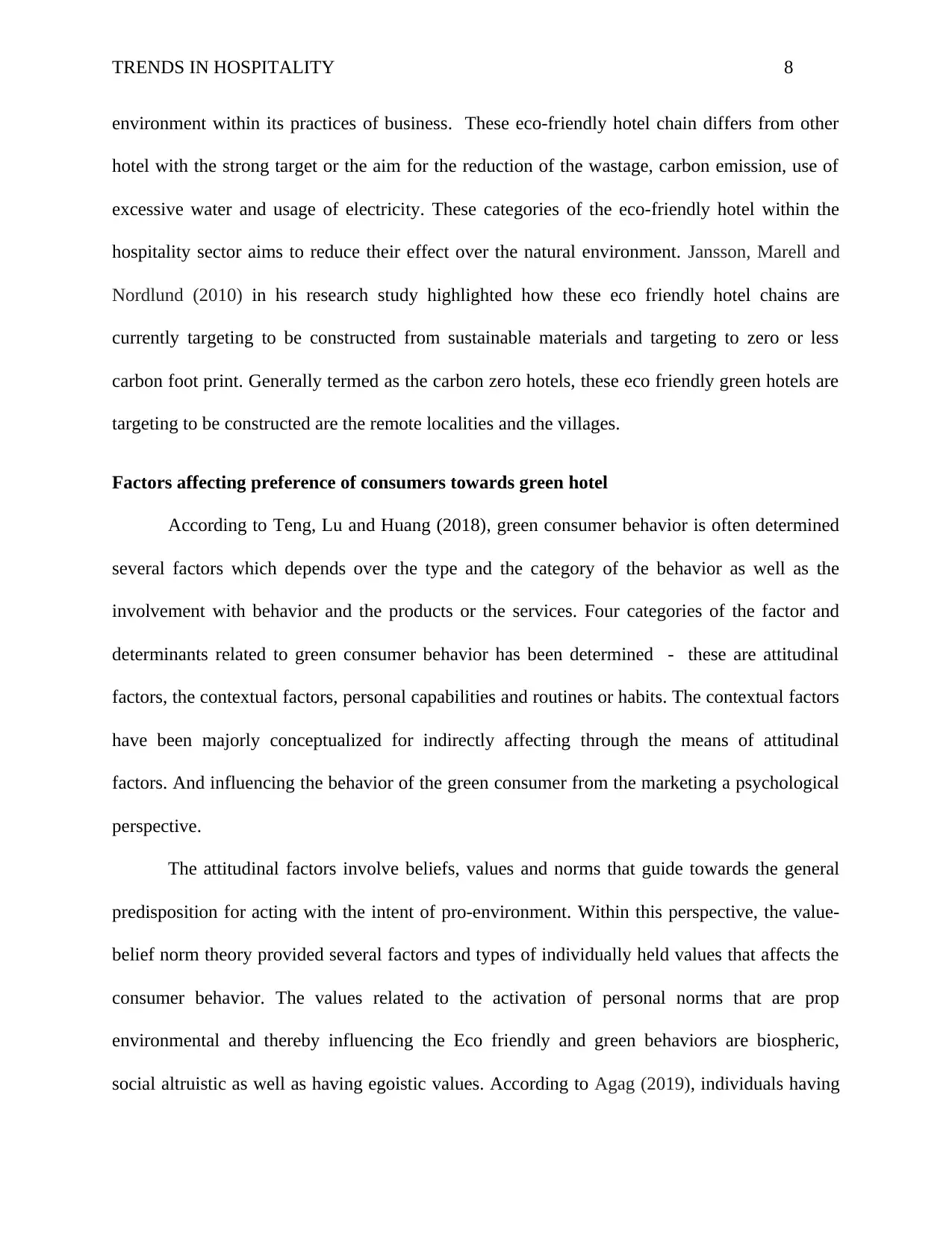
TRENDS IN HOSPITALITY 8
environment within its practices of business. These eco-friendly hotel chain differs from other
hotel with the strong target or the aim for the reduction of the wastage, carbon emission, use of
excessive water and usage of electricity. These categories of the eco-friendly hotel within the
hospitality sector aims to reduce their effect over the natural environment. Jansson, Marell and
Nordlund (2010) in his research study highlighted how these eco friendly hotel chains are
currently targeting to be constructed from sustainable materials and targeting to zero or less
carbon foot print. Generally termed as the carbon zero hotels, these eco friendly green hotels are
targeting to be constructed are the remote localities and the villages.
Factors affecting preference of consumers towards green hotel
According to Teng, Lu and Huang (2018), green consumer behavior is often determined
several factors which depends over the type and the category of the behavior as well as the
involvement with behavior and the products or the services. Four categories of the factor and
determinants related to green consumer behavior has been determined - these are attitudinal
factors, the contextual factors, personal capabilities and routines or habits. The contextual factors
have been majorly conceptualized for indirectly affecting through the means of attitudinal
factors. And influencing the behavior of the green consumer from the marketing a psychological
perspective.
The attitudinal factors involve beliefs, values and norms that guide towards the general
predisposition for acting with the intent of pro-environment. Within this perspective, the value-
belief norm theory provided several factors and types of individually held values that affects the
consumer behavior. The values related to the activation of personal norms that are prop
environmental and thereby influencing the Eco friendly and green behaviors are biospheric,
social altruistic as well as having egoistic values. According to Agag (2019), individuals having
environment within its practices of business. These eco-friendly hotel chain differs from other
hotel with the strong target or the aim for the reduction of the wastage, carbon emission, use of
excessive water and usage of electricity. These categories of the eco-friendly hotel within the
hospitality sector aims to reduce their effect over the natural environment. Jansson, Marell and
Nordlund (2010) in his research study highlighted how these eco friendly hotel chains are
currently targeting to be constructed from sustainable materials and targeting to zero or less
carbon foot print. Generally termed as the carbon zero hotels, these eco friendly green hotels are
targeting to be constructed are the remote localities and the villages.
Factors affecting preference of consumers towards green hotel
According to Teng, Lu and Huang (2018), green consumer behavior is often determined
several factors which depends over the type and the category of the behavior as well as the
involvement with behavior and the products or the services. Four categories of the factor and
determinants related to green consumer behavior has been determined - these are attitudinal
factors, the contextual factors, personal capabilities and routines or habits. The contextual factors
have been majorly conceptualized for indirectly affecting through the means of attitudinal
factors. And influencing the behavior of the green consumer from the marketing a psychological
perspective.
The attitudinal factors involve beliefs, values and norms that guide towards the general
predisposition for acting with the intent of pro-environment. Within this perspective, the value-
belief norm theory provided several factors and types of individually held values that affects the
consumer behavior. The values related to the activation of personal norms that are prop
environmental and thereby influencing the Eco friendly and green behaviors are biospheric,
social altruistic as well as having egoistic values. According to Agag (2019), individuals having
⊘ This is a preview!⊘
Do you want full access?
Subscribe today to unlock all pages.

Trusted by 1+ million students worldwide
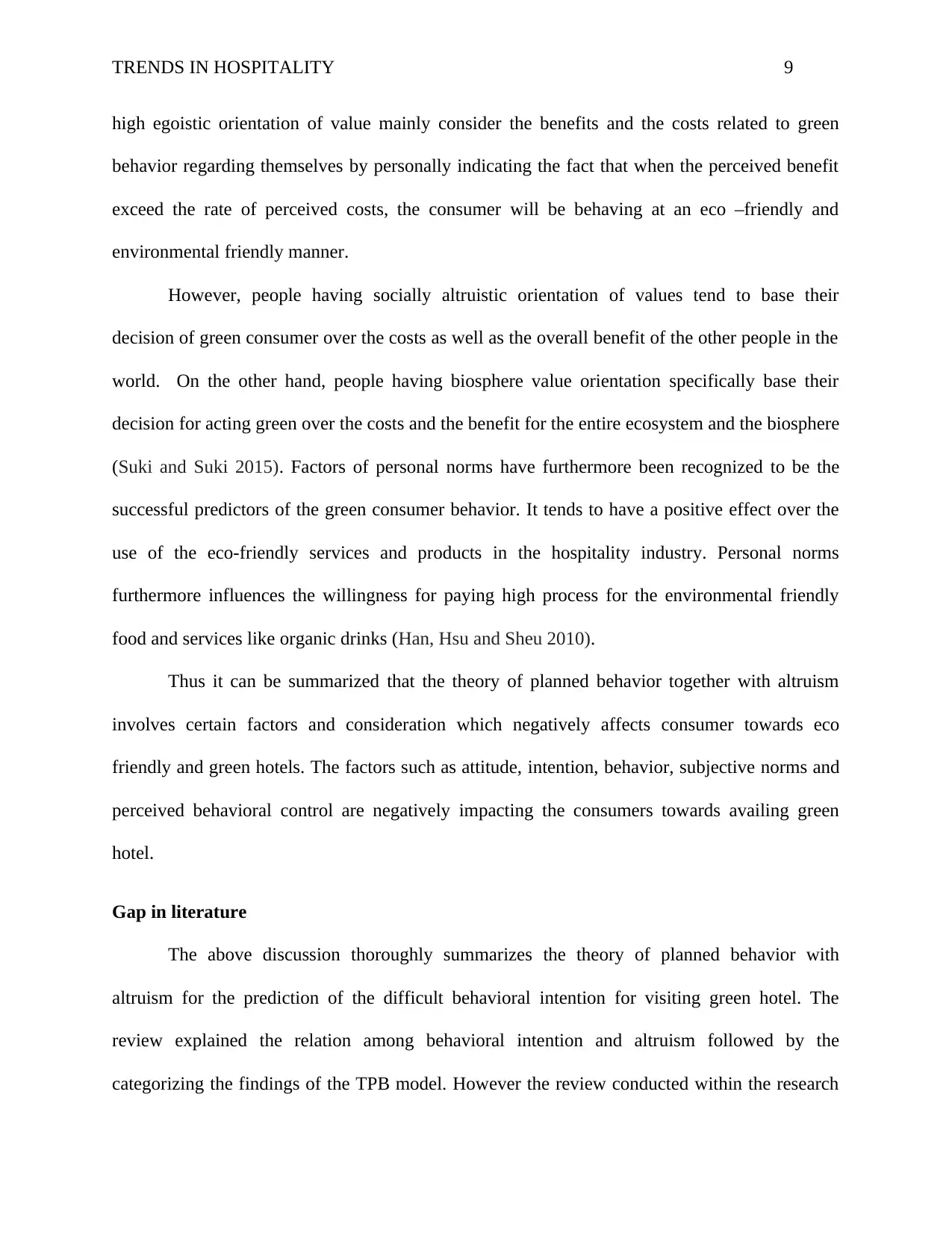
TRENDS IN HOSPITALITY 9
high egoistic orientation of value mainly consider the benefits and the costs related to green
behavior regarding themselves by personally indicating the fact that when the perceived benefit
exceed the rate of perceived costs, the consumer will be behaving at an eco –friendly and
environmental friendly manner.
However, people having socially altruistic orientation of values tend to base their
decision of green consumer over the costs as well as the overall benefit of the other people in the
world. On the other hand, people having biosphere value orientation specifically base their
decision for acting green over the costs and the benefit for the entire ecosystem and the biosphere
(Suki and Suki 2015). Factors of personal norms have furthermore been recognized to be the
successful predictors of the green consumer behavior. It tends to have a positive effect over the
use of the eco-friendly services and products in the hospitality industry. Personal norms
furthermore influences the willingness for paying high process for the environmental friendly
food and services like organic drinks (Han, Hsu and Sheu 2010).
Thus it can be summarized that the theory of planned behavior together with altruism
involves certain factors and consideration which negatively affects consumer towards eco
friendly and green hotels. The factors such as attitude, intention, behavior, subjective norms and
perceived behavioral control are negatively impacting the consumers towards availing green
hotel.
Gap in literature
The above discussion thoroughly summarizes the theory of planned behavior with
altruism for the prediction of the difficult behavioral intention for visiting green hotel. The
review explained the relation among behavioral intention and altruism followed by the
categorizing the findings of the TPB model. However the review conducted within the research
high egoistic orientation of value mainly consider the benefits and the costs related to green
behavior regarding themselves by personally indicating the fact that when the perceived benefit
exceed the rate of perceived costs, the consumer will be behaving at an eco –friendly and
environmental friendly manner.
However, people having socially altruistic orientation of values tend to base their
decision of green consumer over the costs as well as the overall benefit of the other people in the
world. On the other hand, people having biosphere value orientation specifically base their
decision for acting green over the costs and the benefit for the entire ecosystem and the biosphere
(Suki and Suki 2015). Factors of personal norms have furthermore been recognized to be the
successful predictors of the green consumer behavior. It tends to have a positive effect over the
use of the eco-friendly services and products in the hospitality industry. Personal norms
furthermore influences the willingness for paying high process for the environmental friendly
food and services like organic drinks (Han, Hsu and Sheu 2010).
Thus it can be summarized that the theory of planned behavior together with altruism
involves certain factors and consideration which negatively affects consumer towards eco
friendly and green hotels. The factors such as attitude, intention, behavior, subjective norms and
perceived behavioral control are negatively impacting the consumers towards availing green
hotel.
Gap in literature
The above discussion thoroughly summarizes the theory of planned behavior with
altruism for the prediction of the difficult behavioral intention for visiting green hotel. The
review explained the relation among behavioral intention and altruism followed by the
categorizing the findings of the TPB model. However the review conducted within the research
Paraphrase This Document
Need a fresh take? Get an instant paraphrase of this document with our AI Paraphraser
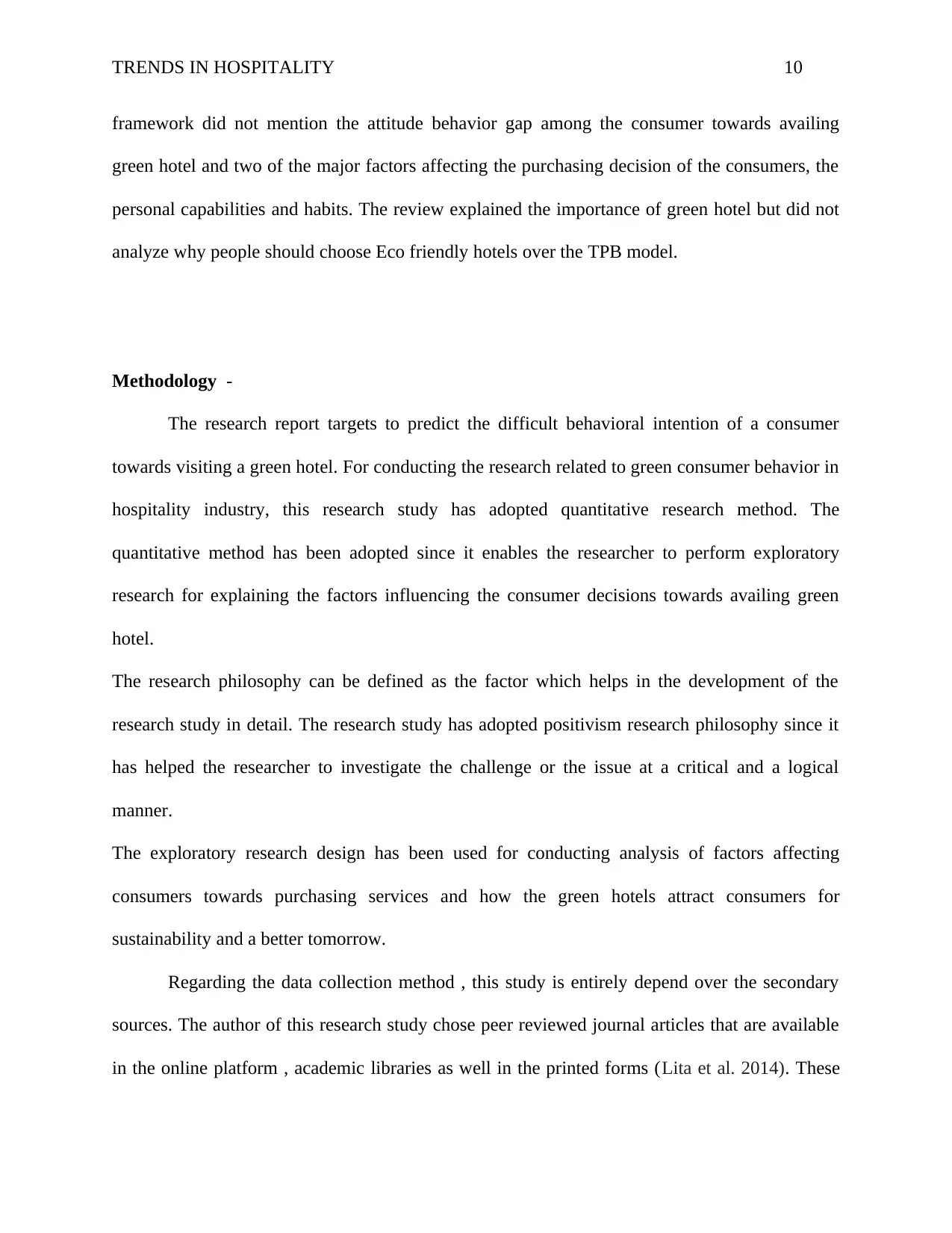
TRENDS IN HOSPITALITY 10
framework did not mention the attitude behavior gap among the consumer towards availing
green hotel and two of the major factors affecting the purchasing decision of the consumers, the
personal capabilities and habits. The review explained the importance of green hotel but did not
analyze why people should choose Eco friendly hotels over the TPB model.
Methodology -
The research report targets to predict the difficult behavioral intention of a consumer
towards visiting a green hotel. For conducting the research related to green consumer behavior in
hospitality industry, this research study has adopted quantitative research method. The
quantitative method has been adopted since it enables the researcher to perform exploratory
research for explaining the factors influencing the consumer decisions towards availing green
hotel.
The research philosophy can be defined as the factor which helps in the development of the
research study in detail. The research study has adopted positivism research philosophy since it
has helped the researcher to investigate the challenge or the issue at a critical and a logical
manner.
The exploratory research design has been used for conducting analysis of factors affecting
consumers towards purchasing services and how the green hotels attract consumers for
sustainability and a better tomorrow.
Regarding the data collection method , this study is entirely depend over the secondary
sources. The author of this research study chose peer reviewed journal articles that are available
in the online platform , academic libraries as well in the printed forms (Lita et al. 2014). These
framework did not mention the attitude behavior gap among the consumer towards availing
green hotel and two of the major factors affecting the purchasing decision of the consumers, the
personal capabilities and habits. The review explained the importance of green hotel but did not
analyze why people should choose Eco friendly hotels over the TPB model.
Methodology -
The research report targets to predict the difficult behavioral intention of a consumer
towards visiting a green hotel. For conducting the research related to green consumer behavior in
hospitality industry, this research study has adopted quantitative research method. The
quantitative method has been adopted since it enables the researcher to perform exploratory
research for explaining the factors influencing the consumer decisions towards availing green
hotel.
The research philosophy can be defined as the factor which helps in the development of the
research study in detail. The research study has adopted positivism research philosophy since it
has helped the researcher to investigate the challenge or the issue at a critical and a logical
manner.
The exploratory research design has been used for conducting analysis of factors affecting
consumers towards purchasing services and how the green hotels attract consumers for
sustainability and a better tomorrow.
Regarding the data collection method , this study is entirely depend over the secondary
sources. The author of this research study chose peer reviewed journal articles that are available
in the online platform , academic libraries as well in the printed forms (Lita et al. 2014). These
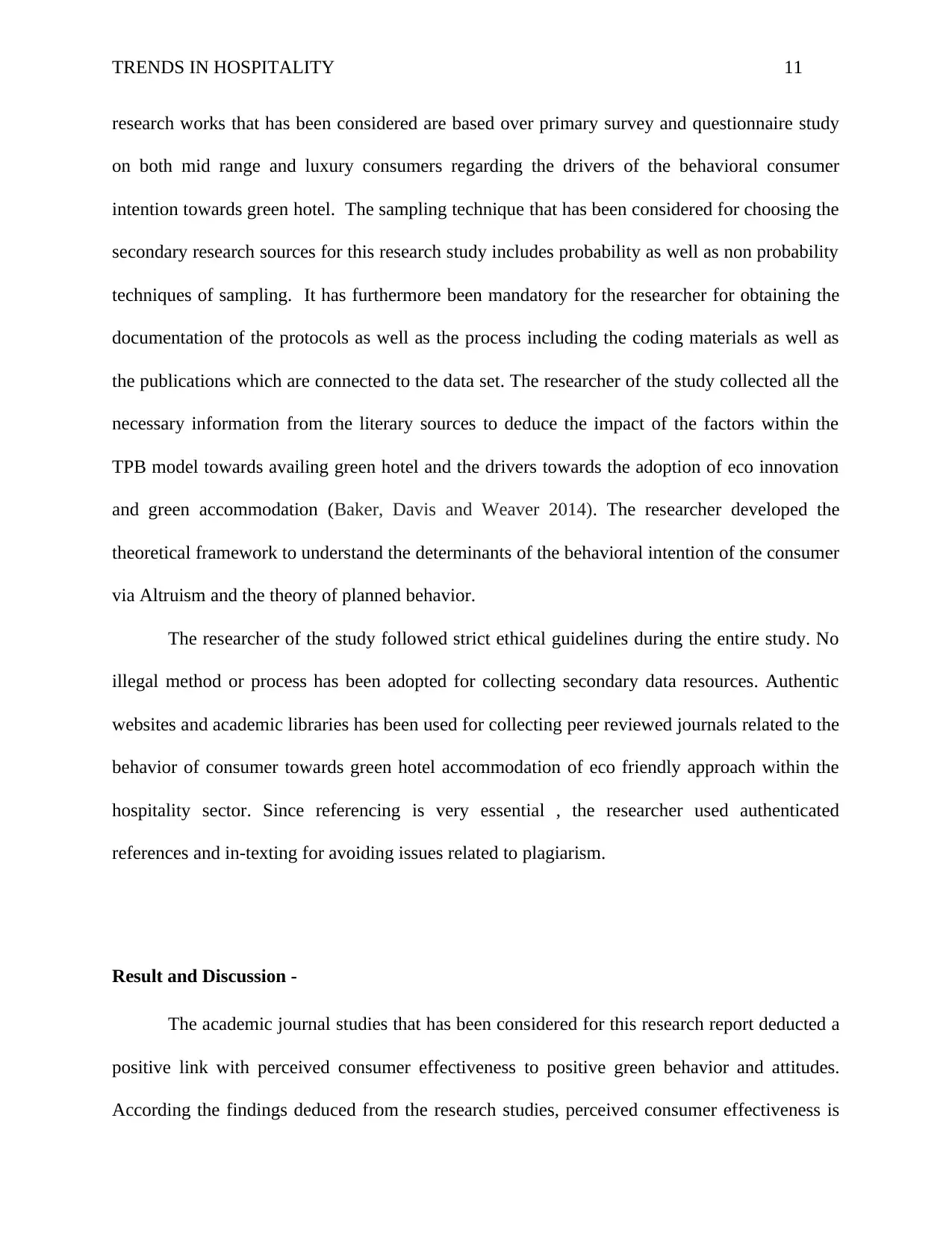
TRENDS IN HOSPITALITY 11
research works that has been considered are based over primary survey and questionnaire study
on both mid range and luxury consumers regarding the drivers of the behavioral consumer
intention towards green hotel. The sampling technique that has been considered for choosing the
secondary research sources for this research study includes probability as well as non probability
techniques of sampling. It has furthermore been mandatory for the researcher for obtaining the
documentation of the protocols as well as the process including the coding materials as well as
the publications which are connected to the data set. The researcher of the study collected all the
necessary information from the literary sources to deduce the impact of the factors within the
TPB model towards availing green hotel and the drivers towards the adoption of eco innovation
and green accommodation (Baker, Davis and Weaver 2014). The researcher developed the
theoretical framework to understand the determinants of the behavioral intention of the consumer
via Altruism and the theory of planned behavior.
The researcher of the study followed strict ethical guidelines during the entire study. No
illegal method or process has been adopted for collecting secondary data resources. Authentic
websites and academic libraries has been used for collecting peer reviewed journals related to the
behavior of consumer towards green hotel accommodation of eco friendly approach within the
hospitality sector. Since referencing is very essential , the researcher used authenticated
references and in-texting for avoiding issues related to plagiarism.
Result and Discussion -
The academic journal studies that has been considered for this research report deducted a
positive link with perceived consumer effectiveness to positive green behavior and attitudes.
According the findings deduced from the research studies, perceived consumer effectiveness is
research works that has been considered are based over primary survey and questionnaire study
on both mid range and luxury consumers regarding the drivers of the behavioral consumer
intention towards green hotel. The sampling technique that has been considered for choosing the
secondary research sources for this research study includes probability as well as non probability
techniques of sampling. It has furthermore been mandatory for the researcher for obtaining the
documentation of the protocols as well as the process including the coding materials as well as
the publications which are connected to the data set. The researcher of the study collected all the
necessary information from the literary sources to deduce the impact of the factors within the
TPB model towards availing green hotel and the drivers towards the adoption of eco innovation
and green accommodation (Baker, Davis and Weaver 2014). The researcher developed the
theoretical framework to understand the determinants of the behavioral intention of the consumer
via Altruism and the theory of planned behavior.
The researcher of the study followed strict ethical guidelines during the entire study. No
illegal method or process has been adopted for collecting secondary data resources. Authentic
websites and academic libraries has been used for collecting peer reviewed journals related to the
behavior of consumer towards green hotel accommodation of eco friendly approach within the
hospitality sector. Since referencing is very essential , the researcher used authenticated
references and in-texting for avoiding issues related to plagiarism.
Result and Discussion -
The academic journal studies that has been considered for this research report deducted a
positive link with perceived consumer effectiveness to positive green behavior and attitudes.
According the findings deduced from the research studies, perceived consumer effectiveness is
⊘ This is a preview!⊘
Do you want full access?
Subscribe today to unlock all pages.

Trusted by 1+ million students worldwide
1 out of 18
Related Documents
Your All-in-One AI-Powered Toolkit for Academic Success.
+13062052269
info@desklib.com
Available 24*7 on WhatsApp / Email
![[object Object]](/_next/static/media/star-bottom.7253800d.svg)
Unlock your academic potential
Copyright © 2020–2026 A2Z Services. All Rights Reserved. Developed and managed by ZUCOL.





